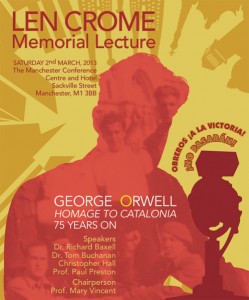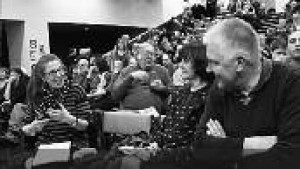Orwell’s Homage to Catalonia revisited

Poster of the 2013 Len Crome Memorial Lecture in Manchester shows George Orwell speaking into a BBC microphone.
This article appeared in the 35th issue of the newsletter of the International Brigade Memorial Trust and is reprinted here with the IBMT’s permission.
The IBMT’s annual Len Crome Memorial Lecture drew an attendance of over 180 people at the Manchester Conference Centre on 2 March. The film-maker Ken Loach sent a message of support, describing the volunteers who served in Spain on the Republican side as the “flower of their generation”.
The focus of the event was the following month’s 75th anniversary of the publication of “Homage to Catalonia” by George Orwell.
Three historians took part in the proceedings, which were chaired by Professor Mary Vincent of Sheffield University. They were Richard Baxell, a specialist on the volunteers in the Spanish Civil War from Britain and Ireland, Tom Buchanan, who teaches at Oxford University and has written about the British left and the war in Spain, and Chris Hall, whose book on the Independent Labour Party volunteers has been updated and was re-published in March. Both Baxell and Hall are also IBMT Trustees.
From the platform “Homage to Catalonia” was praised for its literary merits, but criticised for its historical weaknesses and political naivety. If there was a consensus, it was that Orwell’s work is a brilliant eye-witness account of the reality of war and an important personal political testament, but a partial and unreliable record of the Spanish Civil War as a whole.
It remains, however, the most widely read book about the Spanish Civil War, so retains a powerful influence on public knowledge and attitudes about the war. This fact was reflected during the conference sessions in at times heated contributions from the audience about the merits and flaws of Orwell’s memoir.
Impression
A paper presented to the conference by leading Spanish Civil War historian and author Professor Paul Preston noted: “Orwell’s book in isolation gives the impression that the key events of the Spanish Civil War took place on the Aragon front and during the May Days of 1937 and, most misleading of all, promotes the idea that the Spanish Republic was defeated because of communist policy.” Preston was unable to attend the conference at the last minute because of ill-health and his paper was read out by the IBMT Secretary, Jim Jump.
Orwell was stationed on the Arragon front as a member of the militia of the Barcelona-based POUM revolutionary communist party – often labelled as Trotskyist. He also witnessed the fighting in Barcelona between communist-led Spanish government forces and the anarcho-syndicalist CNT and their POUM allies in May 1937. The anti-government forces were crushed, after which the POUM was banned. Many of its members were imprisoned and its leader, Andreu Nin, was murdered by Soviet secret agents.
Orwell’s account of the POUM’s suppression, and likewise Ken Loach’s 1995 film “Land and Freedom”, which is largely based on “Homage to Catalonia”, fostered the belief, said Preston, “that the fight of the Brigaders and of the Spanish people was not a fight against Spanish fascism and its German and Italian allies but rather part of an internecine leftist civil war in which the central villain was the Communist Party”. Yet even Orwell later acknowledged in a 1943 essay that the outcome of the war in Spain had been “settled in London, Paris, Rome, Berlin – at any rate not in Spain”.
 Preston argued that Orwell had failed to recognise the imperatives that led the Spanish Republic to centralise and prioritise its war effort and to ease food shortages by disbanding the militias and, in the face of CNT opposition, liberalising agricultural production and industry.
Preston argued that Orwell had failed to recognise the imperatives that led the Spanish Republic to centralise and prioritise its war effort and to ease food shortages by disbanding the militias and, in the face of CNT opposition, liberalising agricultural production and industry.
With Hitler and Mussolini giving generous military assistance to Franco and Britain and France applying their policy of “non-intervention”, thus preventing the Spanish Republic from buying arms on the open market, the government’s moves were supported by the Spanish communists, moderate socialists and left-republicans. And they were backed by Stalin, who, as part of his aim of securing an anti-Nazi alliance with France, wanted the Spanish Republican authorities to quash the revolutionaries who had seized local power in Catalonia following the military uprising in July 1936.
Richard Baxell’s talk centred on the reactions of the members of the British Battalion of the International Brigades to these events. During the street fighting in Barcelona early in May 1937 they were at the front line in the Jarama Valley near Madrid. Almost entirely dependent for news on Communist Party sources and publications – which denigrated the POUM as “fifth columnists” and agents of Franco – most understandably took a dim view of the POUM.
Baxell also described the contacts that Orwell had in Britain and Spain with Communist Party and British Battalion representatives. Indeed, until the fighting in May, Orwell had entertained the idea of joining the International Brigades.
Praising “Homage to Catalonia” as “the single best eye-witness account both for insight and interest”, Tom Buchanan spoke about its reception by the left in Britain on publication in 1938. The book appeared in print at a time when reports in the Daily Worker were equating Trotskyism with Nazism. The book sold few copies and it was only during the Cold War and following publication of Orwell’s critiques of Soviet communism and totalitarianism in “Animal Farm” and “1984” that his Spanish Civil War memoir became a best seller.
While recognising its limitations as a book through which to understand the complexities of the civil war, both Buchanan and Mary Vincent stressed its importance in explaining Orwell’s political “epiphany” – the term used by Vincent – at the start of a political journey that led him to write “Animal Farm” and “1984”.
Orwell’s political naïvety on his arrival in Spain in December 1936 was such that he believed that all “socialists” were part of one “happy family”, said Buchanan. He hurriedly left Spain six months later to escape the suppression of the POUM and with that belief shattered.
Political journey
However, Buchanan acknowledged that Orwell’s subsequent political journey was often uneven, with, for example, the author at first saying after the Spanish Civil War that any war with Germany would be an imperialist war, but changing his mind in favour of a form of “patriotic” socialism during the Second World War.
Hall’s talk described Orwell’s comrades in the group of ILP members who joined the POUM militia, concluding that most this contingent of up to 40 volunteers were similar in political outlook and motivation as those who joined the British Battalion – who numbered 2,500.
Among those in the audience to hear these contributions was Peter Blair, adopted son of George Orwell (whose real name was Eric Blair) and Quentin Kopp, son of Orwell’s commanding officer in Spain, Georges Kopp. Both spoke briefly to say how much they were enjoying the IBMT event and to promote the work of the Orwell Society.
Named after the young GP from Blackburn who became head of the medical services of the Inter-national Brigades, the Len Crome Memorial Lecture has been held since 2002. This was the first time it was organised outside London.
The usual format is a single lecture by a guest speaker, but it was decided that this year’s subject matter required more than one speaker.
Richard Baxell’s talk can be viewed at the IBMT’s YouTube site; other contributions will also be added.
——
On the same day as the Len Crome Memorial Lecture in Manchester, the English Defence League staged a demonstration in the city centre. The IBMT sent a message of support to the anti-fascist counter-demonstration.














How can I buy the conference proceedings of such an interesting event?
Do you plan to have other conferences in the near future?
Professor Magda Saura-Carulla, Ph.D. University of California, Berkeley teaching now at
Technical University of Catalonia, Barcelona
The greatest enemy of the fight against Franco, besides Franco himself [obviously] most emphatically and definitely STALINISM. Saying it was “communism” is misleading because at the time of the war it was still possible to be a “communist” and not be a puppet slave of Stalin and his world-wide murder machine.